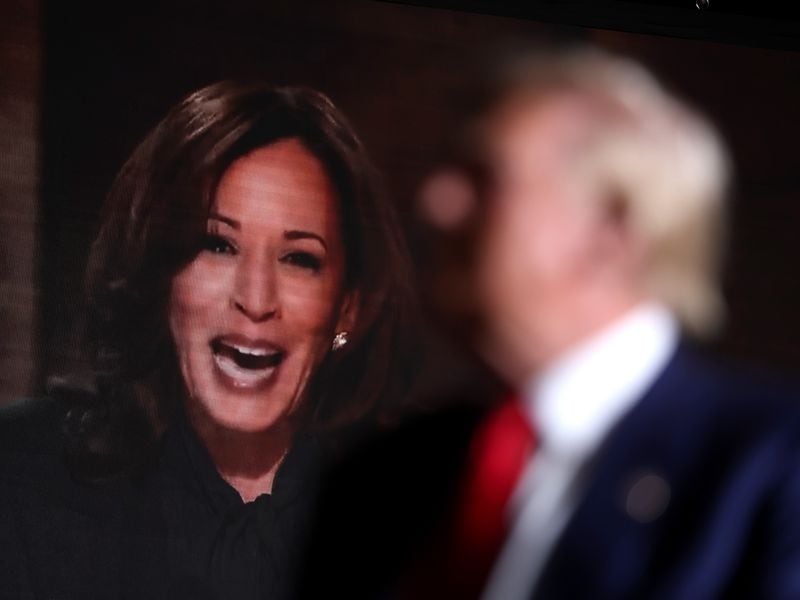Second assassination attempt not boosting Trump’s odds as election betting nears $1 billion on Polymarket
Oral arguments set for Thursday in CFTC appeal of the case it lost to Kalshi.
Are you ready for 20X leveraged election betting?
What will Trump say tonight?
Donald Trump survived an apparent second assassination attempt over the weekend.
The U.S. Secret Service found a man hiding in the bushes with an assault rifle at Trump’s golf course in Florida while the former president was playing. While the gunman, identified as Ryan Wesley Routh of Hawaii, didn’t fire a shot, the very notion of a second assassination attempt during the presidential campaign created headlines like this one from The Economist: “Another attempt on Donald Trump’s life will shake up the election” (though it was later changed to “Another attempt to kill Trump raises fears of political violence”).
Maybe editors at the magazine took a look at crypto-based prediction market platform, Polymarket, where election trading is about to hit $1 billion, because bettors are brushing off this incident as a non-issue.
Trump’s odds actually went down in the hours after the incident, and as of midmorning Monday in New York, he was trailing Democratic nominee Kamala Harris by 49-50.
To be fair to the Economist, the first assassination attempt, when a shot was fired and grazed Trump’s ear, boosted his odds significantly – though that was when he was still running against the senescent incumbent, Joe Biden.
The probabilities are based on how much traders are willing to pay for shares that pay out money if the predictions come true and become worthless if they don’t. Bets on Polymarket are programmed into a smart contract on the Polygon blockchain and paid out in USDC, a dollar-linked token. Under a regulatory settlement, the platform blocks U.S. users, although crafty American traders have used VPNs to get around the geofencing.
As with any U.S. presidential election, a lot is riding on the swing states.
Polymarket bettors are fairly convinced that neither candidate will win all of them: one contract asking if Harris will win all six only gives a 24% chance of that happening, while another asking if Trump will do the same is at 17%.
For the individual state contracts, currently Republicans lead in Arizona with a 61% chance, Georgia at 59%, North Carolina at 57%, and Pennsylvania at 51%. In Nevada, the race is tied 50-50, while Democrats lead in Michigan and Wisconsin.
Meanwhile, Polymarket continues to cast the race as closer than what professional pollsters are calling. Nate Silver’s Silver Bulletin model from Sept. 11 gives Trump a strong chance to win the all-important electoral college at 61%, which, if won, dictates the rest of the election. (Silver is an advisor to Polymarket.)
While all this is happening, U.S.-regulated prediction market Kalshi has frozen its long-sought election markets pending a court decision in an appeal brought by the Commodity Futures Trading Commission. A Kalshi contract on which party will win the House in November had volume of $20,000, while another about which party will win the Senate had volume of $45,000.
The freeze looks set to last at least three more days. Oral arguments in the appeal are scheduled for Thursday, according to a Monday court filing.
Another CFTC-regulated exchange, Interactive Brokers’ ForecastEx, has said it will soon list election markets. Unlike Polymarket, ForecastEx and Kalshi settle bets in fiat.
LogX, a perpetual futures crypto trading protocol, said it raised $4 million to expand into leveraged prediction markets.
The noncustodial “DEX-like” market, which is building what it called a DeFi superapp to onboard the next generation of retail users, said on its website that it will offer up to 20X leverage on contracts on outcomes such as whether Trump or Harris will win the election.
This platform’s approach to prediction markets is similar to D8X, which launched leveraged prediction market trading in July, insofar that it relies on an oracle from Polymarket to scrape pricing data and put it into LogX for traders. However, D8X maxes out at 2X leverage.
Akshit Bordia, LogX’s Founder, explained in an interview that once the pricing data is on the platform, his protocol’s market makers will take opposite positions on Polymarket to generate liquidity.
Right now, Bordia says the maximum bet for Trump or Harris election contracts is $100,000.
“What we’re seeing now is the next iteration of prediction markets,” Bordia said in an interview with CoinDesk. “Many of these have grown significantly, gaining mass media attention. That’s why it’s become so exciting and much bigger than it was in the previous cycle.”
What’s the plan for after the election? Sports and crypto price betting.
Hashed Emergent, Cumberland, DWF Ventures, and Orderly Network CEO Ryan Lee participated in the round.
Trump has been called the first crypto president by his fans, but he hasn’t mentioned bitcoin or other digital assets in his recent public appearances, such as an X space with Elon Musk or the recent presidential debate.
This is likely to change when he takes to Rug Radio late Monday to launch World Liberty Financial, making him the first president to both endorse a specific crypto project and launch a business on the campaign trail.
Bettors on Polymarket are putting their money on Trump saying “crypto” at least five times, giving it a 66% chance of happening and a 34% chance of him saying “bitcoin” that many times.
Unfortunately for those holding Milady NFTs – a collection of characters with bizarrely shaped heads and large, expressive anime-style eyes – there’s only a 3% chance the Republican presidential candidate will name-drop them during the broadcast.

